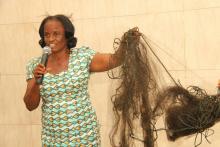WOMEN UNITE FOR THE CLEAN UP OF THE ENVIRONMENT!
Women from the Niger Delta communities in Akwa Ibom, Bayelsa, Cross river, Delta, Edo and Rivers states met on November 22 and 23, 2016 to debate and discuss the implementation of the UNEP report and the clean up process in Ogoniland and other Niger Delta communities. The women came to the meeting with samples of polluted fishing nets, polluted water and congealed crude oil from their communities. It was a safe space for women to learn, exchange and debate the political and practical dimensions of the clean up in Ogoniland and to act as a collective towards the implementation of the emergency measures recommended in the UNEP report. They also strategized on ways to ensure adequate and effective representation of women in the clean up processes.
The strategy meeting deliberated extensively on the impact of the oil extractive activities on women in the Niger Delta and the recent move and efforts of the Federal Government as regards the implementation of the UNEP report and subsequent clean up of Ogoniland.
Declaration
We the women from diverse Niger Delta communities sharing our stories and experiences, having witnessed the impacts in our communities strategizing together on the way forward for the clean up of the Niger Delta environment declare as follows:
Th at oil activities have gravely affected women economically and socially.
- There is a high level of mortality rate in the Niger Delta, the benzene content in water sources from the hydrocarbon pollution has shortened the lifespan of people in Niger Delta communities with many dying on a daily basis.
- Oil activities have destroyed farmlands, polluted rivers, streams, creeks, water ways, and livelihoods.
- The rich mangrove stretches in the Niger Delta have been destroyed with the aquatic richness; prawns, periwinkles, oysters, fishes; crabs, cassava, yam, cocoyam are no longer yielding because of oil spills.
- Gas flaring in the Niger Delta has contributed in no small measure to global warming and climate change.
- Rainwater in the region contains hydrocarbon and is no longer safe for drinking.
- Loss of livelihood means poverty among women, loss of control over children and advent of vices that have overtaken the Niger Delta; loss of respect for family values – promoting violence, kidnapping and other vices, loss of confidence in government; lack of access to healthcare services, increased burden of women unpaid care work, increased rate of school drop-outs & teenage pregnancies, food insecurity; loss of variety of fish, loss of good vegetation species; violence and conflict have left many women widowed.
- The Health Consequences of high-benzene and hydro-carbon contaminated water is dangerous to women and their families as noted in the UNEP report. The Health challenges include, infertility, reduced life expectancy with multiple deaths in the communities, internal heat, rashes, cancer, headache, asthma, eye problem, etc.
- Women bear the brunt of environmental degradation in the Niger Delta and are the first major casualty of environmental pollution.
- Increase incident of infertility with women attaining menopause before the age of 40 years.
DEMANDS
- There should be immediate commencement of provision of pipe-borne water to ensure sources of clean drinking water to communities in the Niger Delta.
- The state of Niger Delta environment should be addressed with sincerity and a sense of urgency.
- Federal Government should be sincere and transparent in all the processes of clean up in Ogoniland and other Niger Delta communities in line with UNEP recommendations.
- Alternative means of livelihood should be provided for women while the environment is being remediated and the choice of alternatives should be generated from due consultation with grassroots women in order to adequately capture the needs and interests.
- Widows should be empowered with new skills and provided with grants to support their businesses.
- Increased economic empowerment opportunities for women with access to credit facilities.
- There should be quality free education including overseas scholarships to move aggrieved youths away from violence and other vices.
- Women should be trained on monitoring oil spills to ensure that best international standards are followed.
- Government should explore and domesticate alternative and renewable energy sources and train women on solar/windmill energy installation.
- Government should set up Standard Specialist Health Facilities in the Niger Delta region.
- Government should monitor and diagnose deaths in communities as well as provide free autopsy services for families.
- There should be adequate and quality representation and inclusion of women and gender sensitive composition in the governance structures in the implementation of the UNEP report and clean-up in Ogoniland.
- Federal Government should set up a Compensation and Development Fund for women in Niger Delta communities.
- Government should harmonise regulations governing solid mineral and oil & gas mineral resources in the Nigeria.
- Federal Government should adopt peoples centred measures to address climate change manifestations in Nigeria.
- Federal Government should end gas flaring in the Niger Delta region.
- Federal Government should end further exploration of oil and gas till the environment is properly remediated.
We commit to stand together in solidarity and unity working for our communities and the success of the implementation of the UNEP report and the clean-up process in Ogoniland and other Niger Delta communties.
WOMEN UNITE FOR THE CLEAN-UP OF THE ENVIRONMENT!
Signed:
- Representative of women from Akwa Ibom state
- Representative of women from Bayelsa State
- Representative of women from Cross River State
- Representative of women from Delta State
- Representative of Women Edo state.
- Representative of women from Rivers state
- Representative of women from Ogoni
- Representative of Kebetkache Women Development & Resource Centre (Conveners)





